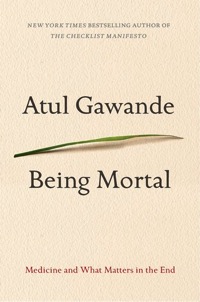It’s not because I’m teetering on the brink of antiquity that I’ve picked up Atul Gawande’s Being Mortal: Medicine and What Matters in the End to read. Rather, I chose it because it was recommended by a medical-student-to-be and because it deals with a subject my profession brings before me with some regularity. Death comes to the archbishop, priest, and parishoner alike. And it will come to me no matter how hard I try to ignore it. Gawande reminds us with relentless detail just how mortal we are.
“…at the age of thirty the brain is a three-pound organ that barely fits inside the skull; by our seventies, gray-matter loss leaves almost an inch of spare room.”
That’s harsh.
We run out of pigment in our scalp (thus re-coloring our hair). Our arteries grow hard and our teeth grow soft. The amount of light reaching the retina of a sixty-year old is 1/3 of that of a twenty-year old. And on he goes. We don’t die as much as we just wear out and run down.
I’m wearing out, and as hard as it is to be reminded of this it is good he has done so. That is, in fact, his point. The things we hide are the things with which we do not rightly deal. We ignore death. We push it aside, and sanitize it in hospitals and nursing homes. We pretend we can escape it, we act as if we can cheat it. But it comes to those we love and it comes to us. So there is wisdom in being forced to face it.
Someone once told me that I would not qualify as “old” until my children were closer to 50 than I am. That threshold is looming, as, perhaps, is “nature’s final victory” (per a surgeon Gawande quotes) And so we pray
Teach us to number our days
that we may get a heart of wisdom. (Psalm 90:12)
